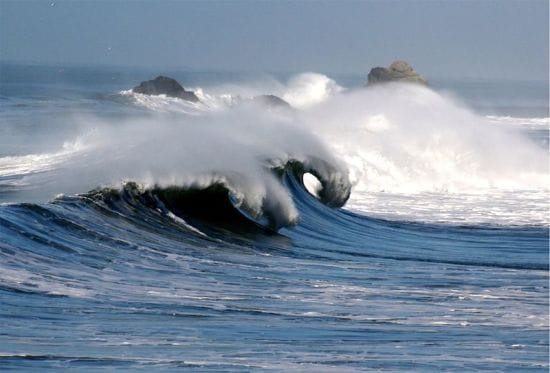PG&E kills wave power projects for California while Scotland moves forward


Pacific Gas & Electric is abandoning pilot projects for wave power off the California coast. It cited lack of funding and high costs of the projects as the primary reasons.
The projects were tiny in size, 2 MW and 5 MW, quite unlike current plans by Lieutenant Governor Gavin Newsom (formerly S.F. Mayor) to build a 10-30 MW wave project near San Francisco which could be expanded to 100 MW. Clearly there are economies of scale in energy projects. The 5 MW PG&E project would have cost at least $50 million while San Francisco's has been estimated at $120-140 million, less than three times the cost for potentially vastly more power.
The ocean is an unforgiving place. Salt corrodes equipment. Wind and waves knock things around. However, development of wave power continues. There are a fascinating number of wave energy generation systems being tested now: oyster-like contraptions that sit on the ocean floor, buoys and snake-like devices that create power from passing waves, and a new one like looks like a squid.
Scotland thinks wave power can be commercially viable and is marshalling huge resources to find ways to create power from waves, as well as wind and hydro. Scotland has been called the "Saudi Arabia of renewable energy" and is already generating more energy than it uses. Once they harness more of it, specifically wave and tidal, their energy output will be prodigious. One wonders why California can't do this too.
The European Union may put substantial funds into a wave power project in Scotland. If funded and built, it will be the biggest grid-connected wave energy system in the world. Multiple other wave power projects are being planned or have already begun in Scotland. Wave power, unlike wind or solar, is quite dependable and steady. It's doesn't fluctuate much, especially not in the windy and stormy ocean off the north of Scotland. It seems to me that Scotland is racing ahead, developing important new technologies while California took a few timid baby steps then gave up. Some company, maybe several of them, will figure out how to do wave power at grid scale. But it doesn't look like such companies will be from California or even from the US.
Europe has a vision, a big one. They want to produce as much of their own power as possible from renewable sources, and they want to do it relatively soon. This isn't just because they want to hug trees and stop climate change. They are also doing it because they don't want to rely on dicey oil and gas pipelines, which pass through sometimes unstable and unfriendly areas. The Desertec Foundation, which is backed by huge Eurozone commercial interests, wants to install vast solar power in the Sahara, and then send what those countries don't use to Europe via direct current. That's what I mean by thinking big. There are no such projects in the U.S. or California on this scale. And there need to be. We are falling behind.


